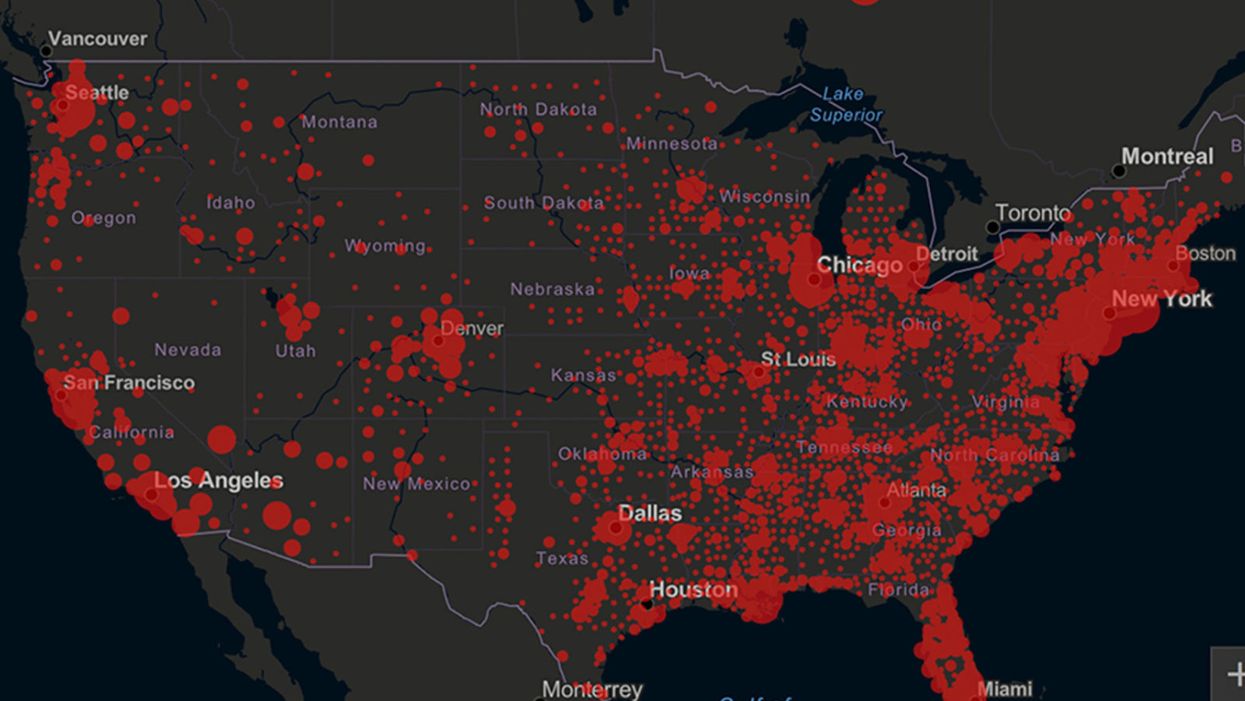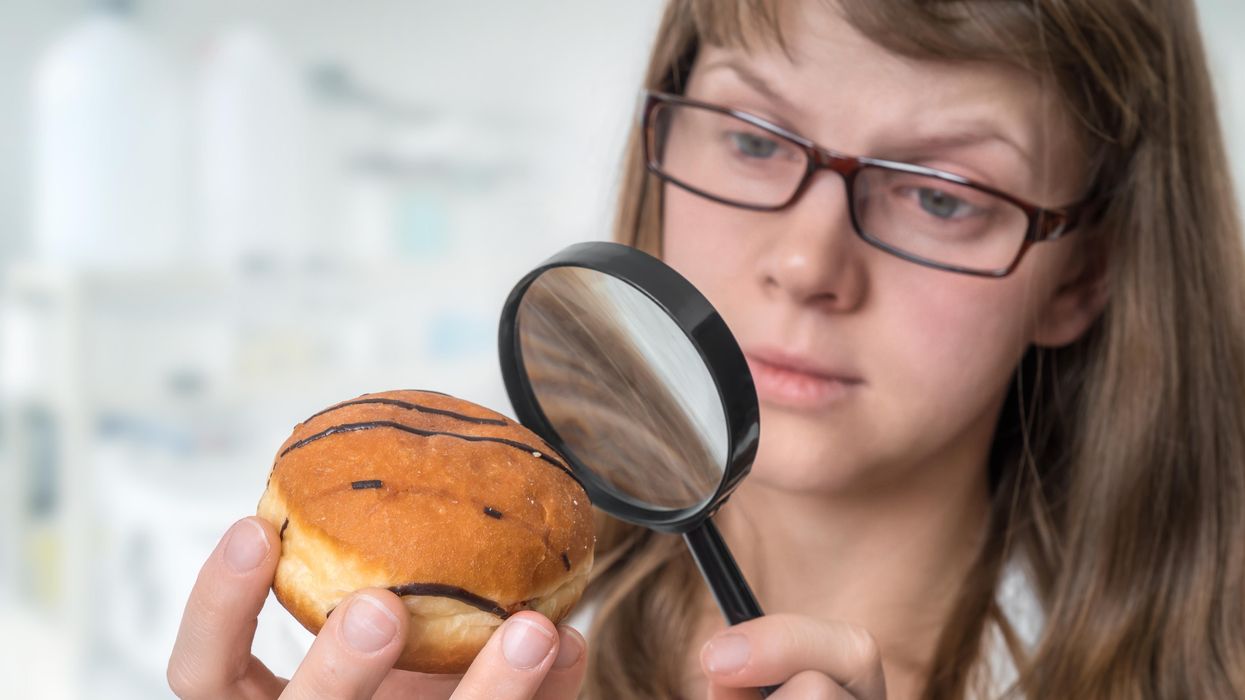How Excessive Regulation Helped Ignite COVID-19's Rampant Spread

Screenshot of an interactive map of coronavirus cases across the United States, current as of 1:45 p.m. Pacific time on Tuesday, March 31st. Full map accessible at https://coronavirus.jhu.edu/map.html
When historians of the future look back at the 2020 pandemic, the heroic work of Helen Y. Chu, a flu researcher at the University of Washington, will be worthy of recognition.
Chu's team bravely defied the order and conducted the testing anyway.
In late January, Chu was testing nasal swabs for the Seattle Flu Study to monitor influenza spread when she learned of the first case of COVID-19 in Washington state. She deemed it a pressing public health matter to document if and how the illness was spreading locally, so that early containment efforts could succeed. So she sought regulatory approval to adapt the Flu Study to test for the coronavirus, but the federal government denied the request because the original project was funded to study only influenza.
Aware of the urgency, Chu's team bravely defied the order and conducted the testing anyway. Soon they identified a local case in a teenager without any travel history, followed by others. Still, the government tried to shutter their efforts until the outbreak grew dangerous enough to command attention.
Needless testing delays, prompted by excessive regulatory interference, eliminated any chances of curbing the pandemic at its initial stages. Even after Chu went out on a limb to sound alarms, a heavy-handed bureaucracy crushed the nation's ability to roll out early and widespread testing across the country. The Centers for Disease Control and Prevention infamously blundered its own test, while also impeding state and private labs from coming on board, fueling a massive shortage.
The long holdup created "a backlog of testing that needed to be done," says Amesh Adalja, an infectious disease specialist who is a senior scholar at the Johns Hopkins University Center for Health Security.
In a public health crisis, "the ideal situation" would allow the government's test to be "supplanted by private laboratories" without such "a lag in that transition," Adalja says. Only after the eventual release of CDC's test could private industry "begin in earnest" to develop its own versions under the Food and Drug Administration's emergency use authorization.
In a statement, CDC acknowledged that "this process has not gone as smoothly as we would have liked, but there is currently no backlog for testing at CDC."
Now, universities and corporations are in a race against time, playing catch up as the virus continues its relentless spread, also afflicting many health care workers on the front lines.
"Home-testing accessibility is key to preventing further spread of the COVID-19 pandemic."
Hospitals are attempting to add the novel coronavirus to the testing panel of their existent diagnostic machines, which would reduce the results processing time from 48 hours to as little as four hours. Meanwhile, at least four companies announced plans to deliver at-home collection tests to help meet the demand – before a startling injunction by the FDA halted their plans.
Everlywell, an Austin, Texas-based digital health company, had been set to launch online sales of at-home collection kits directly to consumers last week. Scaling up in a matter of days to an initial supply of 30,000 tests, Everlywell collaborated with multiple laboratories where consumers could ship their nasal swab samples overnight, projecting capacity to screen a quarter-million individuals on a weekly basis, says Frank Ong, chief medical and scientific officer.
Secure digital results would have been available online within 48 hours of a sample's arrival at the lab, as well as a telehealth consultation with an independent, board-certified doctor if someone tested positive, for an inclusive $135 cost. The test has a less than 3 percent false-negative rate, Ong says, and in the event of an inadequate self-swab, the lab would not report a conclusive finding. "Home-testing accessibility," he says, "is key to preventing further spread of the COVID-19 pandemic."
But on March 20, the FDA announced restrictions on home collection tests due to concerns about accuracy. The agency did note "the public health value in expanding the availability of COVID-19 testing through safe and accurate tests that may include home collection," while adding that "we are actively working with test developers in this space."
After the restrictions were announced, Everlywell decided to allocate its initial supply of COVID-19 collection kits to hospitals, clinics, nursing homes, and other qualifying health care companies that can commit to no-cost screening of frontline workers and high-risk symptomatic patients. For now, no consumers can order a home-collection test.
"Losing two months is close to disastrous, and that's what we did."
Currently, the U.S. has ramped up to testing an estimated 100,000 people a day, according to Stat News. But 150,000 or more Americans should be tested every day, says Ashish Jha, professor and director of the Harvard Global Health Institute. Due to the dearth of tests, many sick people who suspect they are infected still cannot get confirmation unless they need to be hospitalized.
To give a concrete sense of how far behind we are in testing, consider Palm Beach County, Fla. The state's only drive-thru test center just opened there, requiring an appointment. The center aims to test 750 people per day, but more than 330,000 people have already called to try to book a slot.
"This is such a rapidly moving infection that losing a few days is bad, and losing a couple of weeks is terrible," says Jha, a practicing general internist. "Losing two months is close to disastrous, and that's what we did."
At this point, it will take a long time to fully ramp up. "We are blindfolded," he adds, "and I'd like to take the blindfolds off so we can fight this battle with our eyes wide open."
Better late than never: Yesterday, FDA Commissioner Stephen Hahn said in a statement that the agency has worked with more than 230 test developers and has approved 20 tests since January. An especially notable one was authorized last Friday – 67 days since the country's first known case in Washington state. It's a rapid point-of-care test from medical-device firm Abbott that provides positive results in five minutes and negative results in 13 minutes. Abbott will send 50,000 tests a day to urgent care settings. The first tests are expected to ship tomorrow.
Your phone could show if a bridge is about to collapse
Researchers have tested a new smartphone app that could gather data about whether bridges are "structurally deficient" —a low-cost citizen-scientist alternative to current methods that are expensive and complex.
In summer 2017, Thomas Matarazzo, then a postdoctoral researcher at the Massachusetts Institute of Technology, landed in San Francisco with a colleague. They rented two cars, drove up to the Golden Gate bridge, timing it to the city’s rush hour, and rode over to the other side in heavy traffic. Once they reached the other end, they turned around and did it again. And again. And again.
“I drove over that bridge 100 times over five days, back and forth,” says Matarazzo, now an associate director of High-Performance Computing in the Center for Innovation in Engineering at the United States Military Academy, West Point. “It was surprisingly stressful, I never anticipated that. I had to maintain the speed of about 30 miles an hour when the speed limit is 45. I felt bad for everybody behind me.”
Matarazzo had to drive slowly because the quality of data they were collecting depended on it. The pair was designing and testing a new smartphone app that could gather data about the bridge’s structural integrity—a low-cost citizen-scientist alternative to the current industrial methods, which aren’t always possible, partly because they’re expensive and complex. In the era of aging infrastructure, when some bridges in the United States and other countries are structurally unsound to the point of collapsing, such an app could inform authorities about the need for urgent repairs, or at least prompt closing the most dangerous structures.
There are 619,588 bridges in the U.S., and some of them are very old. For example, the Benjamin Franklin Bridge connecting Philadelphia to Camden, N.J., is 96-years-old while the Brooklyn Bridge is 153. So it’s hardly surprising that many could use some upgrades. “In the U.S., a lot of them were built in the post-World War II period to accommodate the surge of motorization,” says Carlo Ratti, architect and engineer who directs the Senseable City Lab at Massachusetts Institute of Technology. “They are beginning to reach the end of their life.”
According to the 2022 American Road & Transportation Builders Association’s report, one in three U.S. bridges needs repair or replacement. The Department of Transportation (DOT) National Bridge Inventory (NBI) database reveals concerning numbers. Thirty-six percent of U.S. bridges need repair work and over 78,000 bridges should be replaced. More than 43,500 bridges are rated in poor condition and classified as “structurally deficient” – an alarming description. Yet, people drive over them 167.5 million times a day. The Pittsburgh bridge which collapsed in January this year—only hours before President Biden arrived to discuss the new infrastructure law—was on the “poor” rating list.
Assessing the structural integrity of a bridge is not an easy endeavor. Most of the time, these are visual inspections, Matarazzo explains. Engineers check cracks, rust and other signs of wear and tear. They also check for wildlife—birds which may build nests or even small animals that make homes inside the bridge structures, which can slowly chip at the structure. However, visual inspections may not tell the whole story. A more sophisticated and significantly more expensive inspection requires placing special sensors on the bridge that essentially listen to how the bridge vibrates.
“Some bridges can afford expensive sensors to do the job, but that comes at a very high cost—hundreds of thousands of dollars per bridge per year,” Ratti says.
We may think of bridges as immovable steel and concrete monoliths, but they naturally vibrate, oscillating slightly. That movement can be influenced by the traffic that passes over them, and even by wind. Bridges of different types vibrate differently—some have longer vibrational frequencies and others shorter ones. A good way to visualize this phenomenon is to place a ruler over the edge of a desk and flick it slightly. If the ruler protrudes far off the desk, it will vibrate slowly. But if you shorten the end that hangs off, it will vibrate much faster. It works similarly with bridges, except there are more factors at play, including not only the length, but also the design and the materials used.
The long suspension bridges such as the Golden Gate or Verrazano Narrows, which hang on a series of cables, are more flexible, and their vibration amplitudes are longer. The Golden Gate Bridge can vibrate at 0.106 Hertz, where one Hertz is one oscillation per second. “Think about standing on the bridge for about 10 seconds—that's how long it takes for it to move all the way up and all the way down in one oscillation,” Matarazzo says.
On the contrary, the concrete span bridges that rest on multiple columns like Brooklyn Bridge or Manhattan Bridge, are “stiffer” and have greater vibrational frequencies. A concrete bridge can have a frequency of 10 Hertz, moving 10 times in one second—like that shorter stretch of a ruler.
The special devices that can pick up and record these vibrations over time are called accelerometers. A network of these devices for each bridge can cost $20,000 to $50,000, and more—and require trained personnel to place them. The sensors also must stay on the bridge for some time to establish what’s a healthy vibrational baseline for a given bridge. Maintaining them adds to the cost. “Some bridges can afford expensive sensors to do the job, but that comes at a very high cost—hundreds of thousands of dollars per bridge per year,” Ratti says.
Making sense of the readouts they gather is another challenge, which requires a high level of technical expertise. “You generally need somebody, some type of expert capable of doing the analysis to translate that data into information,” says Matarazzo, which ticks up the price, so doing visual inspections often proves to be a more economical choice for state-level DOTs with tight budgets. “The existing systems work well, but have downsides,” Ratti says. The team thought the old method could use some modernizing.
Smartphones, which are carried by millions of people, contain dozens of sensors, including the accelerometers capable of picking up the bridges’ vibrations. That’s why Matarazzo and his colleague drove over the bridge 100 times—they were trying to pick up enough data. Timing it to rush hour supported that goal because traffic caused more “excitation,” Matarazzo explains. “Excitation is a big word we use when we talk about what drives the vibration,” he says. “When there's a lot of traffic, there's more excitation and more vibration.” They also collaborated with Uber, whose drivers made 72 trips across the bridge to gather data in different cars.
The next step was to clean the data from “noise”—various vibrations that weren’t relevant to the bridge but came from the cars themselves. “It could be jumps in speed, it could be potholes, it could be a bunch of other things," Matarazzo says. But as the team gathered more data, it became easier to tell the bridge vibrational frequencies from all others because the noises generated by cars, traffic and other things tend to “cancel out.”
The team specifically picked the Golden Gate bridge because the civil structural engineering community had studied it extensively over the years and collected a host of vibrational data, using traditional sensors. When the researchers compared their app-collected frequencies with those gathered by 240 accelerometers formerly placed on the Golden Gate, the results were the same—the data from the phones converged with that from the bridge’s sensors. The smartphone-collected data were just as good as those from industry devices.
The study authors estimate that officials could use crowdsourced data to make key improvements that would help new bridges to last about 14 years longer.
The team also tested their method on a different type of bridge—not a suspension one like the Golden Gate, but a concrete span bridge in Ciampino, Italy. There they compared 280 car trips over the bridge to the six sensors that had been placed on the bridge for seven months. The results were slightly less matching, but a larger volume of trips would fix the divergence, the researchers wrote in their study, titled Crowdsourcing bridge dynamic monitoring with smartphone vehicle trips, published last month in Nature Communications Engineering.
Although the smartphones proved effective, the app is not quite ready to be rolled out commercially for people to start using. “It is still a pilot version,” so there’s room for improvement, says Ratti, who co-authored the study. “But on a more optimistic note, it has really low barriers to entry—all you need is smartphones on cars—so that makes the system easy to reach a global audience.” And the study authors estimate that the use of crowdsourced data would result in a new bridge lasting about 14 years longer.
Matarazzo hopes that the app could be eventually accessible for your average citizen scientist to collect the data and supply it to their local transportation authorities. “I hope that this idea can spark a different type of relationship with infrastructure where people think about the data they're collecting as some type of contribution or investment into their communities,” he says. “So that they can help their own department of transportation, their own municipality to support that bridge and keep it maintained better, longer and safer.”
Lina Zeldovich has written about science, medicine and technology for Popular Science, Smithsonian, National Geographic, Scientific American, Reader’s Digest, the New York Times and other major national and international publications. A Columbia J-School alumna, she has won several awards for her stories, including the ASJA Crisis Coverage Award for Covid reporting, and has been a contributing editor at Nautilus Magazine. In 2021, Zeldovich released her first book, The Other Dark Matter, published by the University of Chicago Press, about the science and business of turning waste into wealth and health. You can find her on http://linazeldovich.com/ and @linazeldovich.
The Friday Five: Sugar could help catch cancer early
In this week's Friday Five, catching cancer early could depend on sugar, how to boost memory in a flash, a tiny sandwich cake could help the heart, and meet the top banana in the fight against Covid.
The Friday Five covers five stories in research that you may have missed this week. There are plenty of controversies and troubling ethical issues in science – and we get into many of them in our online magazine – but this news roundup focuses on scientific creativity and progress to give you a therapeutic dose of inspiration headed into the weekend.
Listen on Apple | Listen on Spotify | Listen on Stitcher | Listen on Amazon | Listen on Google
Here are the promising studies covered in this week's Friday Five:
- Catching cancer early could depend on sugar
- How to boost memory in a flash
- This is your brain on books
- A tiny sandwich cake could help the heart
- Meet the top banana for fighting Covid variants

